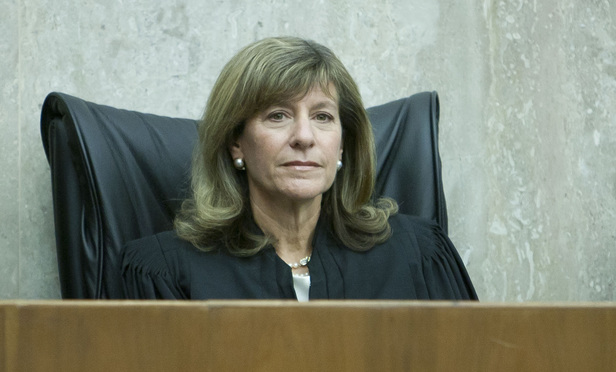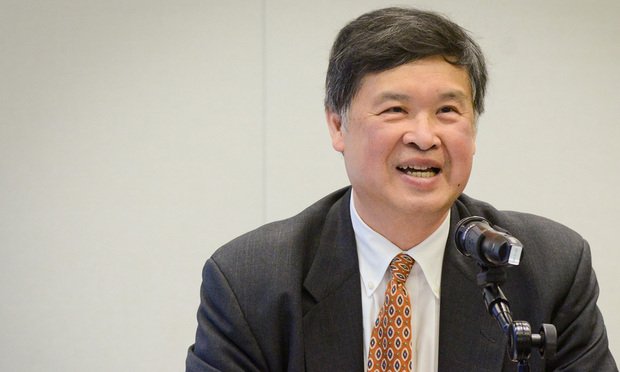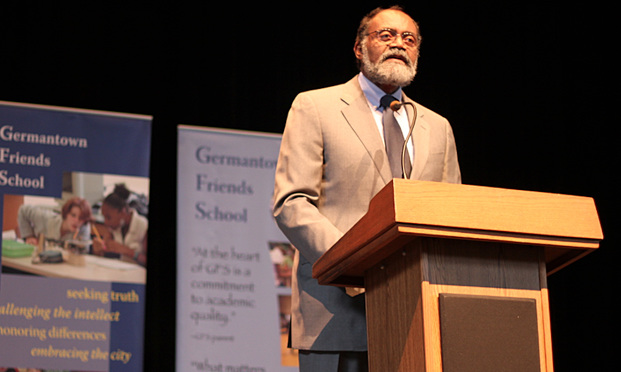The Hardest Thing About Being a Judge? What Courts Say About Sentencing.
"It is just not a natural or everyday thing to do—to pass judgment on people, to send them to prison or not," one federal appeals judge once remarked. Here's a look at how judges across courts have described the challenge of sentencing, as Roger Stone prepares to learn his fate.
February 19, 2020 at 01:00 PM
9 minute read
 U.S. District Judge Amy Berman Jackson. Photo: Diego M. Radzinschi/ALM
U.S. District Judge Amy Berman Jackson. Photo: Diego M. Radzinschi/ALM
Updated 10:25 a.m. on Feb. 20
As judges are often quick to say, sentencing defendants ranks near or at the top of the most challenging parts of serving on the bench.
Federal sentencing guidelines are discretionary, giving judges some leeway in announcing punishment from probation, in some cases, to prison. At the same time, the advisory guidelines brought a measure of consistency to the judiciary. Some crimes come with mandatory minimums.
"Every first-year law student learns that sentencing has four goals: retribution, incapacitation, deterrence and rehabilitation," former U.S. District Judge Shira Scheindlin of the Southern District of New York wrote in 2017, in a piece that lamented some of the mandatory stiff sentences she was required, by law, to impose on certain defendants. U.S. District Judge T.S. Ellis III of the Eastern District of Virginia said at the sentencing hearing for Paul Manafort, the former Trump campaign chairman: "Deterrence is endlessly debated by academics based on empirical studies. It's a hard, hard issue."
U.S. District Judge Amy Berman Jackson of the District of Columbia is scheduled Thursday to sentence Roger Stone, the longtime friend of President Donald Trump, and the punishment she hands out will face enormous public scrutiny.
The Stone sentencing comes amid a backdrop of tumult at the U.S. Justice Department, after U.S. Attorney General William Barr intervened in the process and asserted that a prison recommendation of seven to nine years, made by career prosecutors applying the sentencing guidelines, was excessive. Trump thanked Barr for "taking charge" of the prosecution of Stone, who was convicted on charges of lying to Congress and witness tampering in the Russia probe. The four assigned prosecutors withdrew from the case, and one resigned from his post as an assistant U.S. attorney.
Jackson's served on the Washington federal trial bench since 2010, an arrival that came after years of work as a prosecutor and later as a defense lawyer.
"I am a real person and I relate to other people from all walks of life," Jackson said at her confirmation hearing in 2010. "And I think that ability to connect and to understand will inform my judging, hopefully, inform my temperament and help me to achieve the goal that I have, which is to rule efficiently, because I think people are waiting for your rulings, and to rule clearly, because I think people need to understand them."
In the run-up to the hearing Thursday, Chief U.S. District Judge Beryl Howell of the District of Columbia, who earlier served on the U.S. Sentencing Commission, asserted in a rare public statement that "public criticism or pressure" will not be a factor in whatever punishment Jackson announces.
"The judges of this court base their sentencing decisions on careful consideration of the actual record in the case before them; the applicable sentencing guidelines and statutory factors; the submissions of the parties, the probation office and victims; and their own judgment and experience," Howell said.
Howell's statement reflected her long history of studying sentencing and handing out sentences. "One measure of the fairness of the sentencing hearing is that the participants know what material the sentencing judge has read or reviewed that may influence the outcome," Howell said in remarks at the University of Chicago Law School in 2018.
Writing at The New York Law Journal in 2018, former federal prosecutor Joel Cohen, now of counsel at Stroock & Stroock & Lavan, said: "It seems to me that we want every single judge to struggle, perhaps in their own idiosyncratic way, every single time they are required to impose a sentence."
Here's a look at some of the things judges have said over the years about the challenge of sentencing:
 Judge Denny Chin of the U.S. Court of Appeals for the Second Circuit. Photo: David Handschu / ALM
Judge Denny Chin of the U.S. Court of Appeals for the Second Circuit. Photo: David Handschu / ALM>> Judge Denny Chin of the U.S. Court of Appeals for the Second Circuit: "It is just not a natural or everyday thing to do—to pass judgment on people, to send them to prison or not. I mean, there is so much at stake, and there are so many different considerations that come into play." [The New York Times]
>> Retired U.S. District Judge Ruben Castillo of the Northern District of Illinois: "I have found that every sentencing proceeding is unique, inherently difficult to adjudicate, and involves the most human aspect of our judicial-making process. … The more difficult decisions always involve sentencing men and women with spouses and children to extended terms of confinement in prison." [American Bar Association]
>> Judge Robin Rosenberg of the U.S. District Court for the Southern District of Florida: "Sentencing is a profound moment in a criminal case and in a defendant's life. The exchange between a judge and defendant is central to the court's role as adjudicator and as one human being sitting in judgment of another. While other aspects of the criminal justice system may at times seem mechanical, sentencing hearings are, at their core, deeply personal interactions." [Judicature]
>> U.S. District Judge Clay Land of the Middle District of Georgia: "Taking away someone's freedom is an awesome responsibility, particularly when it affects other innocent persons, such as family members. So I agonize more over sentencing decisions than any other part of my job." [Daily Report Online]
 Judge Theodore McKee of the U.S. Court of Appeals for the Third Circuit. Photo: Matthew Grady for NewsWorks
Judge Theodore McKee of the U.S. Court of Appeals for the Third Circuit. Photo: Matthew Grady for NewsWorks>> Judge Theodore McKee of the U.S. Court of Appeals for the Third Circuit: "State side—sentencing was very difficult; the emotional difficulty of sentencing is taxing." [American Bar Association]
>> Retired U.S. District Judge Jack Weinstein of the Eastern District of New York: "Sentencing, that is to say punishment, is perhaps the most difficult task of a trial court judge. It turns on the judge's heart and life experience. It reveals the human face of the law. Without empathy between judge and defendant, sentencing lacks humanity. It becomes a form of robotism." [Touro Law Review]
>> U.S. District Judge Timothy Corrigan of the Middle District of Florida: "I am sometimes asked what's the most important attribute of a good judge. I used to answer that question differently, but now I say "humility." This is especially true in sentencing. No matter how long we have done it, we can never forget what an awesome responsibility it is to decide whether and for how long to deprive someone of their liberty." [Judicature]
>> The late U.S. District Judge Alicemarie Stotler of the Central District of California: "Sentencing is usually one of the most difficult jobs for any judge to deal with, because the punishment has to fit the crime; the defendant and society's rightful needs in perhaps avenging some wrong which has been done." [Confirmation hearing, 1984]
>> Judge Gerard Lynch of the U.S. Court of Appeals for the Second Circuit: "I did not expect sentencing people to prison to feel good. But I was sorry and surprised to find that the very first sentence I imposed felt like an injustice. And not a small one." [Journal of Criminal Law and Criminology, 2001]
 Supreme Court Justice Sonia Sotomayor. Photo: Diego M. Radzinschi/ National Law Journal.
Supreme Court Justice Sonia Sotomayor. Photo: Diego M. Radzinschi/ National Law Journal.>>U.S. Supreme Court Justice Sonia Sotomayor: "Crime is crime and to the extent that you're protecting the interests of society, you take your cues from the statute Congress gives and the sentencing range that Congress sets. And so to the extent that in all my cases I balanced the individual sentence with, as I was directed to, the interests that society sought to protect, then I applied that evenhandedly to all cases." [Confirmation hearing, 2009]
>>U.S. District Judge J. Randal Hall of the Southern District of Georgia: "Sentencing is the most difficult part of the job. The power to direct our nation's government to take away a person's liberty is a heavy burden. I never lose sight of the impact of incarceration on a defendant's spouse, partner, children, parents and other loved ones." [Daily Report Online]
>> The late Judge Irving Kaufman of the U.S. Court of Appeals for the Second Circuit: "If the hundreds of American judges who sit on criminal cases were polled as to what was the most trying facet of their jobs, the vast majority would almost certainly answer 'sentencing.' In no other judicial function is the judge more alone; no other act of his carries greater potentialities for good or evil than the determination of how society will treat its transgressors." [The Atlantic]
Read more:
Chief Judge Defends Amy Berman Jackson Ahead of Stone Sentencing
DOJ's Roger Stone Debacle Puts New Focus on Judge Amy Berman Jackson
Judge Amy Berman Jackson's Had a Front Row Seat for Mueller Cases
Amy Berman Jackson, Judge Assigned to Manafort Case, No Stranger to Spotlight
Jonathan Ringel contributed reporting from Georgia and Nate Robson contributed from Washington. An earlier version of this report misidentified the court where Judge Robin Rosenberg presides; she sits on the Southern District of Florida bench.
This content has been archived. It is available through our partners, LexisNexis® and Bloomberg Law.
To view this content, please continue to their sites.
Not a Lexis Subscriber?
Subscribe Now
Not a Bloomberg Law Subscriber?
Subscribe Now
NOT FOR REPRINT
© 2025 ALM Global, LLC, All Rights Reserved. Request academic re-use from www.copyright.com. All other uses, submit a request to [email protected]. For more information visit Asset & Logo Licensing.
You Might Like
View All

'A Warning Shot to Board Rooms': DOJ Decision to Fight $14B Tech Merger May Be Bad Omen for Industry

'Incredibly Complicated'? Antitrust Litigators Identify Pros and Cons of Proposed One Agency Act
5 minute readTrending Stories
- 1Uber Files RICO Suit Against Plaintiff-Side Firms Alleging Fraudulent Injury Claims
- 2The Law Firm Disrupted: Scrutinizing the Elephant More Than the Mouse
- 3Inherent Diminished Value Damages Unavailable to 3rd-Party Claimants, Court Says
- 4Pa. Defense Firm Sued by Client Over Ex-Eagles Player's $43.5M Med Mal Win
- 5Losses Mount at Morris Manning, but Departing Ex-Chair Stays Bullish About His Old Firm's Future
Who Got The Work
J. Brugh Lower of Gibbons has entered an appearance for industrial equipment supplier Devco Corporation in a pending trademark infringement lawsuit. The suit, accusing the defendant of selling knock-off Graco products, was filed Dec. 18 in New Jersey District Court by Rivkin Radler on behalf of Graco Inc. and Graco Minnesota. The case, assigned to U.S. District Judge Zahid N. Quraishi, is 3:24-cv-11294, Graco Inc. et al v. Devco Corporation.
Who Got The Work
Rebecca Maller-Stein and Kent A. Yalowitz of Arnold & Porter Kaye Scholer have entered their appearances for Hanaco Venture Capital and its executives, Lior Prosor and David Frankel, in a pending securities lawsuit. The action, filed on Dec. 24 in New York Southern District Court by Zell, Aron & Co. on behalf of Goldeneye Advisors, accuses the defendants of negligently and fraudulently managing the plaintiff's $1 million investment. The case, assigned to U.S. District Judge Vernon S. Broderick, is 1:24-cv-09918, Goldeneye Advisors, LLC v. Hanaco Venture Capital, Ltd. et al.
Who Got The Work
Attorneys from A&O Shearman has stepped in as defense counsel for Toronto-Dominion Bank and other defendants in a pending securities class action. The suit, filed Dec. 11 in New York Southern District Court by Bleichmar Fonti & Auld, accuses the defendants of concealing the bank's 'pervasive' deficiencies in regards to its compliance with the Bank Secrecy Act and the quality of its anti-money laundering controls. The case, assigned to U.S. District Judge Arun Subramanian, is 1:24-cv-09445, Gonzalez v. The Toronto-Dominion Bank et al.
Who Got The Work
Crown Castle International, a Pennsylvania company providing shared communications infrastructure, has turned to Luke D. Wolf of Gordon Rees Scully Mansukhani to fend off a pending breach-of-contract lawsuit. The court action, filed Nov. 25 in Michigan Eastern District Court by Hooper Hathaway PC on behalf of The Town Residences LLC, accuses Crown Castle of failing to transfer approximately $30,000 in utility payments from T-Mobile in breach of a roof-top lease and assignment agreement. The case, assigned to U.S. District Judge Susan K. Declercq, is 2:24-cv-13131, The Town Residences LLC v. T-Mobile US, Inc. et al.
Who Got The Work
Wilfred P. Coronato and Daniel M. Schwartz of McCarter & English have stepped in as defense counsel to Electrolux Home Products Inc. in a pending product liability lawsuit. The court action, filed Nov. 26 in New York Eastern District Court by Poulos Lopiccolo PC and Nagel Rice LLP on behalf of David Stern, alleges that the defendant's refrigerators’ drawers and shelving repeatedly break and fall apart within months after purchase. The case, assigned to U.S. District Judge Joan M. Azrack, is 2:24-cv-08204, Stern v. Electrolux Home Products, Inc.
Featured Firms
Law Offices of Gary Martin Hays & Associates, P.C.
(470) 294-1674
Law Offices of Mark E. Salomone
(857) 444-6468
Smith & Hassler
(713) 739-1250









